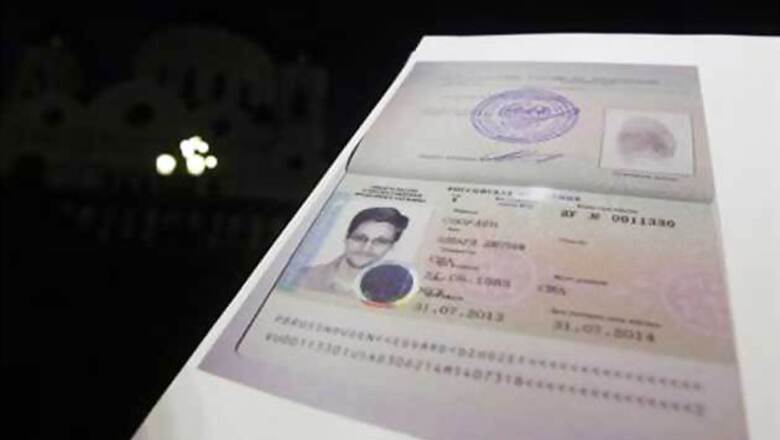
views
US fugitive Edward Snowden seems assured of a warm welcome in Russia and may even achieve celebrity status in his new home, but history suggests he will no longer be master of his fate and a Moscow exile will bring some difficult challenges.
The former US spy agency contractor finally left Moscow's Sheremetyevo airport on Thursday after spending nearly six weeks confined to its transit zone while a diplomatic battle over his future raged between Russia and the United States.
Snowden, sought by Washington on espionage charges for leaking details of Internet and phone surveillance programmes, now embarks on his new life armed with an asylum document that is valid for a year and can be renewed annually.
Former Russian intelligence officers said things will not be easy for Snowden - a highly interesting catch for the Kremlin - if the legacy of earlier defections is any guide.
"Precedents show us that life is hard for defectors from their countries," Lev Korolkov, a former officer in the Soviet KGB security service, told Reuters.
"They experience a huge internal stress that can last for a very long time, sometimes for the rest of their lives - even for those who stayed, such as Kim Philby," he said, referring to one of the British 'Cambridge ring' who spied for the Soviet Union during and after World War Two.
"He (Snowden) was free only as long as he was in the transit zone," Korolkov added.
Snowden is not the first employee of the US National Security Agency (NSA) to defect to Moscow.
NSA cryptologists William Martin and Bernon Mitchell defected to the Soviet Union during the Cold War in 1960 because of disenchantment with US intelligence gathering methods.
The pair denounced Washington for spying on its own allies - charges echoed by Snowden half a century later.
But Martin later called his choice foolhardy as he became disillusioned with the less than ideal life in the Soviet Union and the relevance of their revelations quickly faded.
Other precedents are hardly more encouraging.
Philby, recruited by the Soviets at Cambridge in the 1930s, lived under virtual house arrest after his defection, drank heavily and suffered from loneliness and depression.
Fellow double agent and comrade Guy Burgess also became heavily dependent on alcohol and, despite defecting, continued ordering clothes from London.
Of the high-profile British defectors, only George Blake - not a member of the Cambridge ring - seems to have done well in exile. He married a Russian, is still alive at 90 and was awarded a medal by President Vladimir Putin in 2012.
The Cold War is long over but some things do not change. Snowden is a useful propaganda tool for the Kremlin, which often accuses Washington of preaching on human rights abroad what it fails to practise at home.
"He no longer belongs to himself. He is a political personality and a pawn," said Anna Kachkayeva, a prominent media expert.
"He is like a ticking time-bomb. Maybe they will save him up for something and put him on television - or maybe not."
The Kremlin's decision to harbour Snowden has gone down well with Russian public opinion.
"I don't think he is a traitor, so I think we did the right thing," said a Moscow resident who gave his name as Ivan.
St Petersburg resident Yevgeny agreed. "The Americans have gone too far and someone should wipe their nose. The man stood for the truth, he told the world and we needed to protect him."
Forty three per cent of Russians back the plan to harbour Snowden while 29 per cent are against, according to a survey published on Wednesday by independent pollster Levada.
Snowden has even received a marriage proposal from former Russian spy Anna Chapman, over Twitter, and a job offer from Russia's answer to social networking site Facebook.
A Russian lawyer who is helping Snowden, Anatoly Kucherena, said he had letters from others seeking to hire Snowden, adding that the American would not want for employment.
"I don't exclude that he will have his own TV show," he told Reuters.
The Kremlin has given no indication it wants to turn Snowden into a television star. However, Russian state television has already become a platform for Wikileaks anti-secrecy group founder, Julian Assange, to rail against the United States.
Snowden will stay for now with US expatriates who support his security leaks, Kucherena said, adding that he would soon bring over Snowden's father, Lonnie, along with a US lawyer and other friends, to give the fugitive "moral support".
But Snowden remains vulnerable to a fluid political climate and his usefulness to his Russian hosts will steadily diminish.
"There have always been defectors and their baggage is their knowledge, abilities and skills - what is in his head," ex-KGB officer Korolkov said. But he added: "You know information gets old and loses its value."
Snowden may find that in Russia, he has traded some part of his freedom for security, some experts say.
"I think he may find Russia less appealing than he might have imagined," said Misha Glenny, a British author on Internet security and eastern Europe.
"Snowden may find that it is very, very difficult for him to be involved in some of the activities he wishes to engage in."



















Comments
0 comment